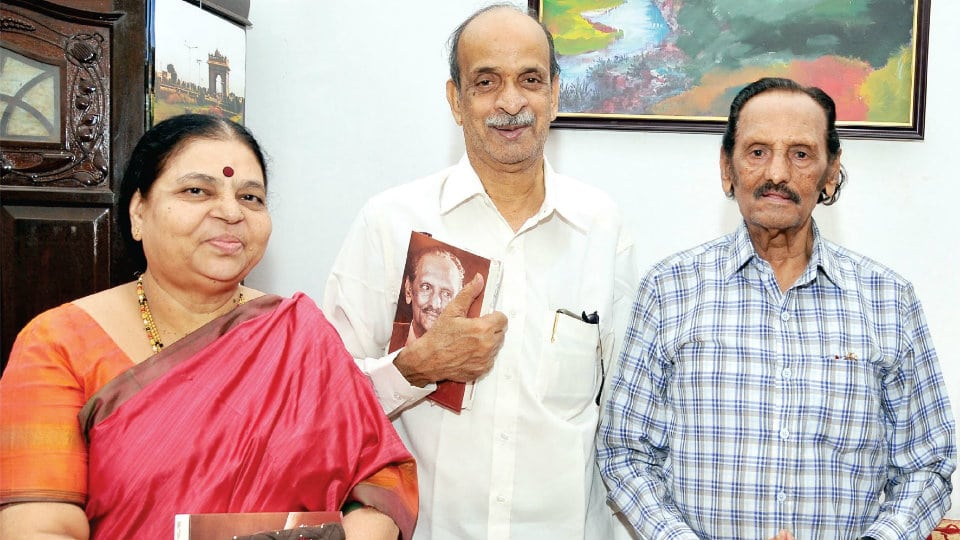By N. Niranjan Nikam
SOM: As you grow older how do you feel? You have earned name and fame as a prominent Karnataka poet. Now what?
Prof. Nissar Ahmed: Oh well, there is no end to desire. I have lived a fine, comfortable and a very colourful life (a bemused smile). Never lived like a vagabond or I never spoilt anybody’s life in the name of love or lust. I have lived a good life and I am happy. That is the secret of my life, now I am 81. Although I feel a little weak physically, I am alive in my thinking and that is because I have lived a clean life. I have never nurtured any hatred towards anybody nor do I think about anybody’s religious identity. For me, humanity is more important than one’s caste or religion.
Every religion preaches goodness. But unfortunately it is used differently for ulterior motives to promote hatred. Islam does not say go and kill innocent people.
SOM: You have never shied away from expressing your views through your poetry. How do you read the political atmosphere in the country at present?
Prof. Nissar Ahmed: At present it is highly polluted compared to what it was 30 or 40 years ago. It is very difficult to express your views. In case you still express, there is danger of being assassinated. What sort of a country is this? Gandhiji taught ahimsa. Our basic Indian value lies in ahimsa and not violence. There is no place where politics has not entered — be it science, literature and in every field and it has corrupted our minds. Today, everybody feels a little uneasy and finds it difficult to live.
SOM: You consider T.S. Chayapathy of Talukina Venkannaiah Smaraka Granthamaale, the publisher of your book, “Aaida Kavithagalu,” in 1974, as an intimate friend. How has this long relationship survived?
Prof. Nissar Ahmed: Chayapathy said he would want to bring out a book of my selected poems. The Wesley Press, Mysuru, printed this. The cover is so good even to this day. He also brought out the latest book ‘Seemateetana Sirivanta Suggi.’ We have been friends since the last 43 years. He was the first to publish another book of mine ‘Othello,’ a translation.
SOM: How long did you teach and how much did you enjoy teaching?
Prof. Nissar Ahmed: I enjoyed teaching. Once I took up Geology, I gave my heart and soul to it. I had to survive and I had to get good marks to get a good job. I used to write too and both teaching and writing went hand-in-hand.
After I graduated, my first aim was to learn how to teach my students. For nearly 20 years I used to teach my students in bombastic English, just to show my erudition and scholarship. Later on I understood that B.Sc. students used to just sit and listen and when I asked if they understood, they would keep mum. Then I decided to explain in Kannada and it was followed by several of my colleagues. I told them that if you teach in English and explain in Kannada, their faces would bloom like a lotus. That is the magic of our mother-tongue. English is after all a foreign language.
SOM: Looking back, apart from all the awards and recognitions, what is your biggest achievement and your failure?
Prof. Nissar Ahmed: It is up to the critics and people. I cannot say something about myself. If I cook food, I cannot talk about it. Only people who have eaten it must tell. By the Grace of Almighty I have got good reviews from stalwarts.
SOM: You have not even spared the media in one of your poems “Suddhi Madhyamagalu.” How do you read present day media with the advent of television channels?
Prof. Nissar Ahmed: Why only in one poem? (Laughs). Media encourages mediocrity. They don’t meddle with people who are full of knowledge and erudition. They only pick on politicians and film actors and pollute the atmosphere. Media sits in judgment and they don’t bother about courts. Media today has lost its credibility. It has become corrupt. Today’s reality shows, where even young children are not spared, have become the order of the day. Instead of focusing on the peacock that is rare to be seen, media focuses on crows.
SOM: But you should have reminisced your past works. How do you resonate to critics?
Prof. Nissar Ahmed: So many times readers will not like what you like, however profound it is. They may like something different. For example ‘Kurigalu Saar Kurigalu’, ‘Nityotsava’ or ‘Nimmodaniddu Nimmanthagade’. I have also written poems with a lot of depth and meaning like ‘Ramanu Sattha Suddi’ and ‘Rangoli Maathu’ and only intellectuals have liked it. There are other people who can appreciate poems but neglect them. They miss poems that convey a message to the society whereas poems on love and relationships are made into songs and become popular. You know where the difficulty lies? The poet is forced to like what his readers like and not the other way round and it happens in every writer’s life.
SOM: What about the title of the book ‘Seemateetana Sirivanta Suggi’?
Prof. Nissar Ahmed: ‘Seemateeta’ means crossing all barriers of caste and creed and ‘Sirivanta Suggi’ means rich harvest. “Rich harvest of a liberated” (Poet).
[Concluded]








Recent Comments